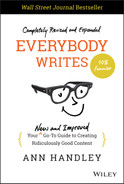81
Writing for Video
I've always hated Video.
I hate having to put my dumb face on camera.
I hate the way I apparently need special equipment to create Video, including something called a “ring light.” (Ugh. What's a ring light?)
I hate the improv of Video. When I'm at a conference and someone points a camera at me and asks me to respond to a question, I choke. I always think of a better, wittier, more succinct answer after I'm back in my hotel room.
(There's a phrase for that, by the way: It's called esprit d'escalier—the regret of thinking of the perfect reply too late. Literally, it means “wit on the staircase.” In my case, it's “wit in a Marriott with a view of the HVAC system.”)
I'm intentionally capitalizing Video like it's a proper noun, by the way, because it has felt like Video and I have been locked in a toxic relationship. The therapist/BuzzFeed quiz I consulted (“Should You Ditch or Stay?”) confirms as much:
- When you spend time together, do you feel uplifted, relaxed, and confident? (No.)
- When you're apart, do you feel certain and at peace about your relationship or do you feel confused and anxious about it? (The second part.)
- When you think of your relationship, do you feel depressed, nervous, and unsure? (Bingo.)
So I had two choices: Clutch my writerly black No. 2 pencil with the sure grip of the righteous, refusing to step out of my comfort zone. Or, for the love of Pete … just work things out with Video, already!
(BuzzFeed Therapist: Try to communicate your concerns without judgment using “When you … I feel …” statements.)
I chose the love-of-Pete path.
And you know what…? I'm glad I did.
Because I realized that my beef with Video was actually fear. Not hate. (Then again, hate and fear are two sides of the same coin.)
And it turns out that the key to successful video actually is writing. (Duh. Scripts.)
What's more, good video and good writing share the same DNA. All the stuff I talk about. Literally. All. The. Time: Relentless focus on the audience. Offering value. Connecting in a real, accessible, human way. An engaging tone of voice.
What's that line about making the blind see? Was it from Isaiah? Or a lyric from Frozen?
All I know is that the BuzzFeed Therapist said in our last session that real progress has been made and she's proud of us.
But writing for video is different from writing generally, says Andrew Davis, who produces a weekly video show called The Loyalty Loop.
Some guidelines:
- Spoken language is not as buttoned up as written language.
- Grammar rules—already flexible for me in writing—should be Simone Biles-flexible in video.
- Write your script without typical punctuation … intentionally use fragment sentences … insert ellipses for pacing … because here's the thing … it'll sound a little less like a Driver's Ed training manual and more like the way people actually … you know … talk? (Thanks, Andrew Davis, for this one.)
- Write your message as a story. Video is show-me media. If your plan is to aim a camera at an exec ticking off a checklist of talking points, that's not the best use of video. Find ways to show, not tell.
- Write your script in the present tense. This is especially important with case studies, testimonials, and explainer videos. You might be talking about something that happened in the past, but make it relevant to the now.
- Delay your reveal. Invite curiosity. So many testimonials, case studies, and corporate videos reveal the resolution of a problem right up front—sometimes in the title of a video itself.
No: “How FreshSmackerz Software Saved Hair Salon Curl Up & Dye Approximately One Million Dollars in Accounting Fees.”
Yes: “Where One Hair Salon Unexpectedly Found One Million Dollars.”
It strikes me that the toxic relationship I let develop between Video and me isn't unlike what adult-onset writers share with me about writing:
- It's complicated. (Meaning: I am unsure about grammar.)
- It's scary. (I worry people will judge what I have to say or how I say it.)
- I don't know where to start this article. (Writing is the ultimate improv: There is no template.)
This isn't news to you, maybe. And even to me, writing this now, it's staring me in the face. But it's more than I fully understood not too long ago.
It's the difference between thumbing through a Fodor's travel guide entry highlighting Lilac Sunday at the Boston Arnold Arboretum, and actually visiting the Arboretum that Sunday and experiencing how the air smells exactly like a detour through Macy's perfume aisle.
It's the difference between knowing something intellectually and then suddenly experiencing it yourself.
